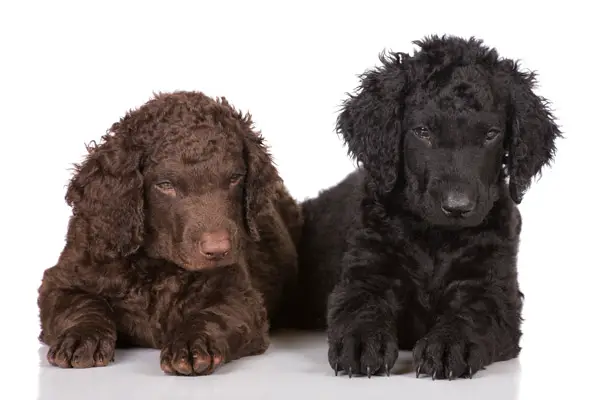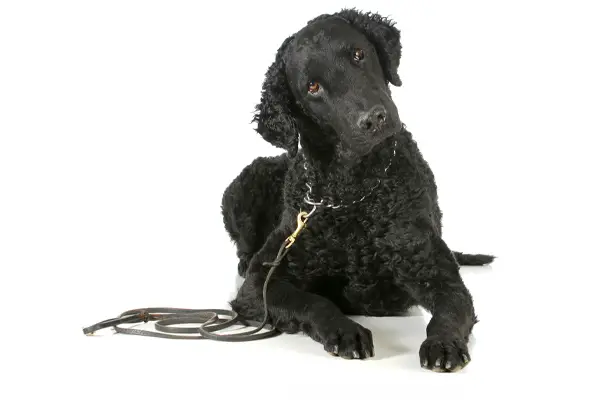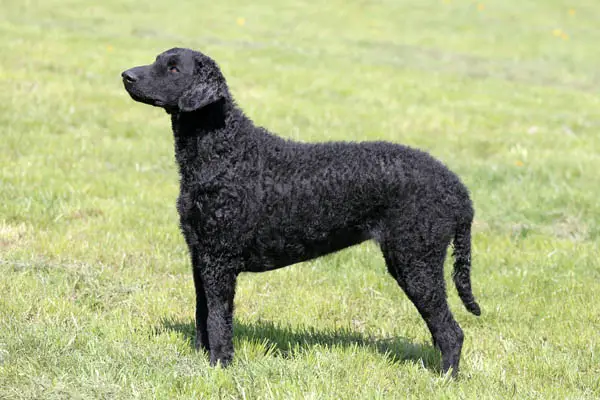Curly-Coated Retrievers are large-sized dogs best known for their tight, crispy curls in black or liver colors. These coats are known to be weatherproof, which gives them enough protection when they’re working. The Curly-Coated Retriever also features a wedge-shaped head that is common to most retriever dogs.
Curly-Coated Retrievers are sweet dogs known for their big hearts. They are very playful dogs that will even make great playmates for children. Their lively personality is the best fit for active families who can give them enough time and attention, so they don’t get bored.

Curly-Coated Retriever Statistics
| Dog Breed Group | Sporting |
| Breed Size | Large |
| Height | 25-27 inches (male); 23-25 inches (female) |
| Weight | 60-95 pounds |
| Lifespan | 10-12 years |
Curly-Coated Retriever Ratings
| Energy level | |
| Exercise needs | |
| Requires attention | |
| Playfulness | |
| Trainability | |
| Shedding | |
| Grooming | |
| Friendly with family | |
| Friendly with kids | |
| Friendly with strangers | |
| Friendly with other dogs | |
| Prey Drive |
Curly-Coated Retriever History
Curly-Coated Retrievers are among the oldest retriever breeds, so little is known of their origin. They are believed to have appeared in England around the 1700s, but their true ancestry has been lost.
Some people believe that these dogs were formed from crossing an English water dog, Irish water spaniel, a small Newfoundland, and a poodle. This is what made them great swimmers and hunters at the same time.
Around 1860, the Curly-Coated Retriever was first shown in England, where they gained immediate popularity. They were most prized by hunters who loved their hunting skills. However, with the appearance of Labrador, their number started to decrease.
By 1919, after World War I, there were only five Curly-Coated Retrievers registered. As they started to recover, the breed almost came to extinction with the second world war.
The American Kennel Club registered the first Curly-Coated Retriever in 1924. And by the late 1960s, their numbers started to come up. However, they are still considered rare as more retriever dogs are preferred than them.
Now, they rank 162nd as the most popular dog breed in the US. They may not be common, but those who own one should know how fine a pet these dogs are.

Curly-Coated Retriever Temperament
Curly-Coated Retrievers are confident, proud, and bright dogs. As hunting dogs, they are quick, agile, and energetic, which means they need their daily exercise. They are best paired with athletic owners who can take them out for a run, bike, hike, or swim.
They are most happy when you do things together, so even if you have a securely fenced yard, don’t let them run off independently. These dogs are mostly even-tempered indoors, especially if they are given enough exercise.
They are sweet and gentle to their families, and they are even good around children. However, considering the size of the breed, you should still keep close supervision with toddlers. They are also friendly with other animals, especially those that grew up with them.
Curlies are also known for being protective, which makes them reserved around strangers. Expect them to bark when someone suspicious comes to your home.
Because of this, early socialization is crucial. This will help them become more well-rounded, and they’ll be able to manage their feelings better.
Training should also come easy. But since these dogs are stubborn, it’s essential to be consistent and firm and never be harsh. Give them lots of positive reinforcements to aid training. This can be in the form of praises or treats.
Curly-Coated Retriever Care Requirements
- Nutrition: Curly-Coated Retrievers should do well on a high-quality and well-balanced diet. You must create a balance of proteins, fats, carbohydrates, and vitamins so your dog remains healthy and fit. For home-cooked meals, you should only buy high-quality ingredients. Find great sources of proteins, fats, and carbohydrates for your dog. Fruits and vegetables are a great addition to their diet to aid with digestion. As for dog food and dog treats, it’s important that you only buy premium quality food. Check the label and make sure that it doesn’t contain fillers, additives, and by-products that will harm your dog. Go to your vet and ask for proper feeding requirements that are tailored-fit to your dog’s needs. And if your dog is allergic to any food ingredient, take note of it and make sure to stay away from those.
- Grooming: As their name implies, Curly-Coated Retrievers have curly coats that cover their entire bodies. These coats shed occasionally, and it usually happens twice a year. Use a rake type tool to brush their hair during the shedding season. This will help remove any loose hair on their skin. After that, you can do some trimming to keep it neat and clean. Don’t brush the coat down as it will cause it to become frizzy. Baths can be given occasionally, and all you need is to wet the coat down and air-dry it. This is the best way to maintain the curls. Every week, make sure to check the ears and clean them out to avoid ear infection. As for the nails, don’t forget to trim it. Long nails can cause pain and discomfort to your dog, so it must be kept short to allow them to move comfortably.
- Exercise: Curly-Coated Retrievers are typically easy to live with, as they are usually calm indoors. However, these are energetic dogs, and they also need regular exercise to remain fit and healthy. No strenuous activity is needed as long as you perform activities that they would enjoy. They likely find it more fun regardless if it’s play sessions or training sessions.
- Health: Curly-Coated Retrievers are healthy dogs, especially if taken care of well. They are very prone to many health conditions, and even if they won’t acquire any of this in their lifetime, it’s still essential for dog owners to be aware of what these are. It’s always best to meet at least one of your dog’s parents to know any existing disease that your dog may acquire. You can also have your dog take a screening test to detect certain conditions at an early stage. It’s crucial to monitor your dog’s behavior continuously, and if you notice any changes, contact the vet immediately. Here are diseases common to your Curly-Coated Retriever:
-
- Bone diseases like hip dysplasia, elbow dysplasia
- Eye diseases like distichiasis and progressive retinal atrophy
- Congenital or hereditary diseases like entropion, ectropion, persistent pupillary membrane, retinal dysplasia
- Pattern Baldness
- Glycogen Storage Disease
- Cancer
- Bloating
-
- Lifespan: The life expectancy of Curly-Coated Retrievers is 10-12 years.

Famous Curly-Coated Retrievers
Knysna Conjurer: The first Curly-Coated Retriever registered by the American Kennel Club.
Fun Facts About Curly-Coated Retrievers
- Curly-Coated Retrievers originated in England around the 1700s.
- Among the oldest retriever breeds.
- They have been purebred since the 1900s, so their original ancestry is unknown.
- They came close to extinction twice, during the two world wars.
- Excellent hunters and swimmers.
- They were recognized by the American Kennel Club in 1924.
Check Out Other Sporting Dog Breeds:
American Water Spaniel, Boykin Spaniel, Brittany, Chesapeake Bay Retriever, Clumber Spaniel, Cocker Spaniel, English Cocker Spaniel, English Setter, English Springer Spaniel, Field Spaniel, Flat-Coated Retriever, German Shorthaired Pointer, German Wirehaired Pointer, Golden Retriever, Gordon Setter, Irish Red and White Setter, Irish Setter, Irish Water Spaniel, Kooikerhondje, Labrador Retriever, Lagotti Romagnoli, Nova Scotia Duck Tolling Retriever, Pointer, Spinoni Italiani, Sussex Spaniel, Vizsla, Weimaraner, Welsh Springer Spaniel, Wirehaired Pointing Griffon, Wirehaired Vizslas
